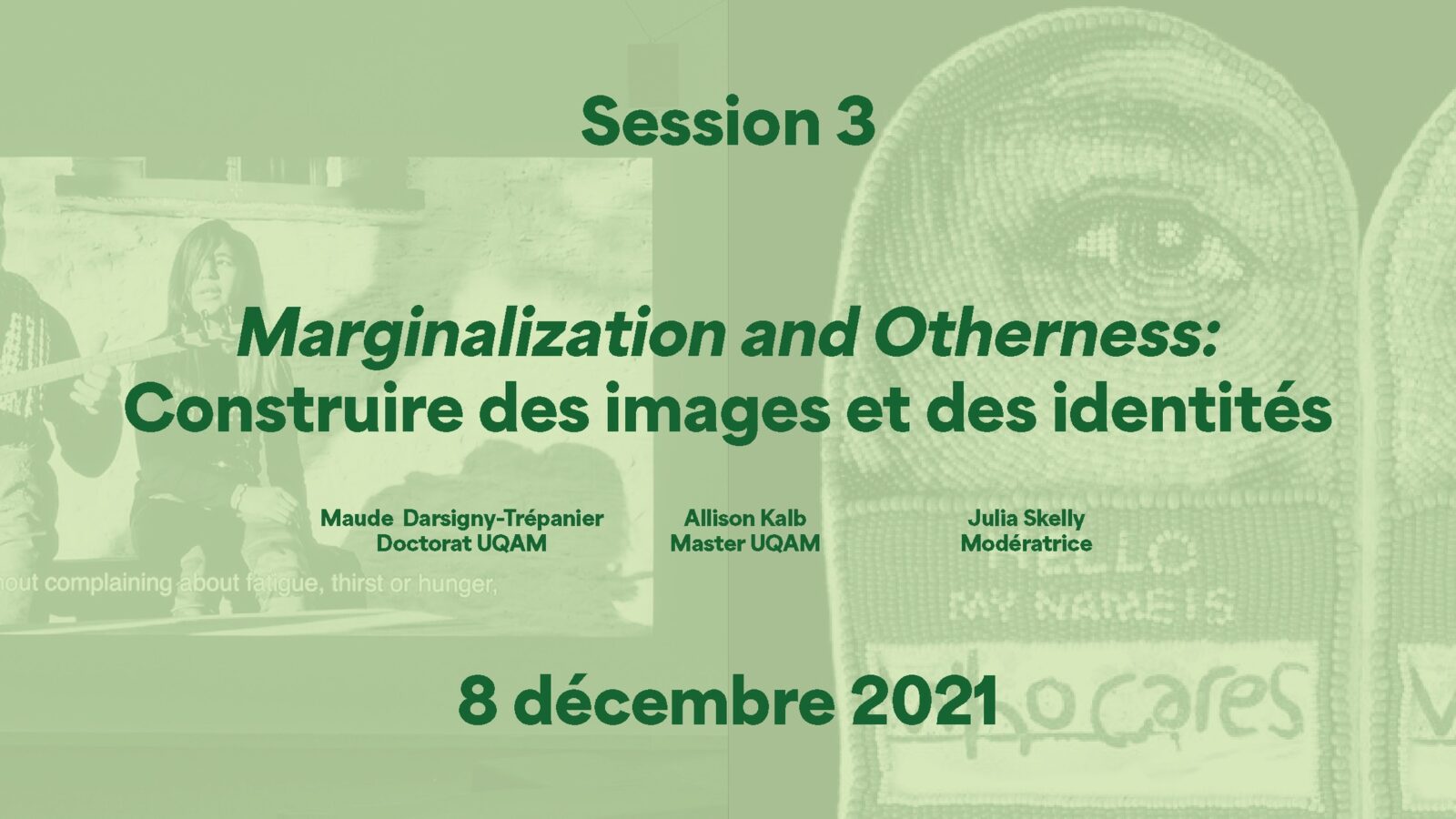Mercredi 8 décembre à 17h 30 dans salle C-3061 dans le Carrefour des Arts et des Sciences a UdeM | Wednesday, December 8th at 5:30 pm in room C-3061 in the Carrefour des Arts et des Sciences at UdeM
Intitulée « Marginalization and Otherness: Construire des images et des identités » cette séance propose des conférences de Maude Darsigny-Trépanier (Doctorat, UQAM) « La représentation des féminicides à travers les mediums dit traditionnellement féminins » et d’Allison Kalb (maitrise, UQAM) « “In the Chaosmosis of These Times”: Mapping Resistance and Solidarity in Angela Melitopoulos’ Crossings (2017) » La présidence de séance sera assurée par Julia Skelly (McGill).
—
Entitled “Marginalization and Otherness: Construire des images et des identités” this session will feature talks by Maude Darsigny-Trépanier (PhD, UQAM) “La représentation des féminicides à travers les mediums dit traditionnellement féminins” and Allison Kalb (MA, UQAM) “ ‘In the Chaosmosis of These Times’: Mapping Resistance and Solidarity in Angela Melitopoulos’ Crossings (2017).” The session will be chaired by Julia Skelly (McGill).
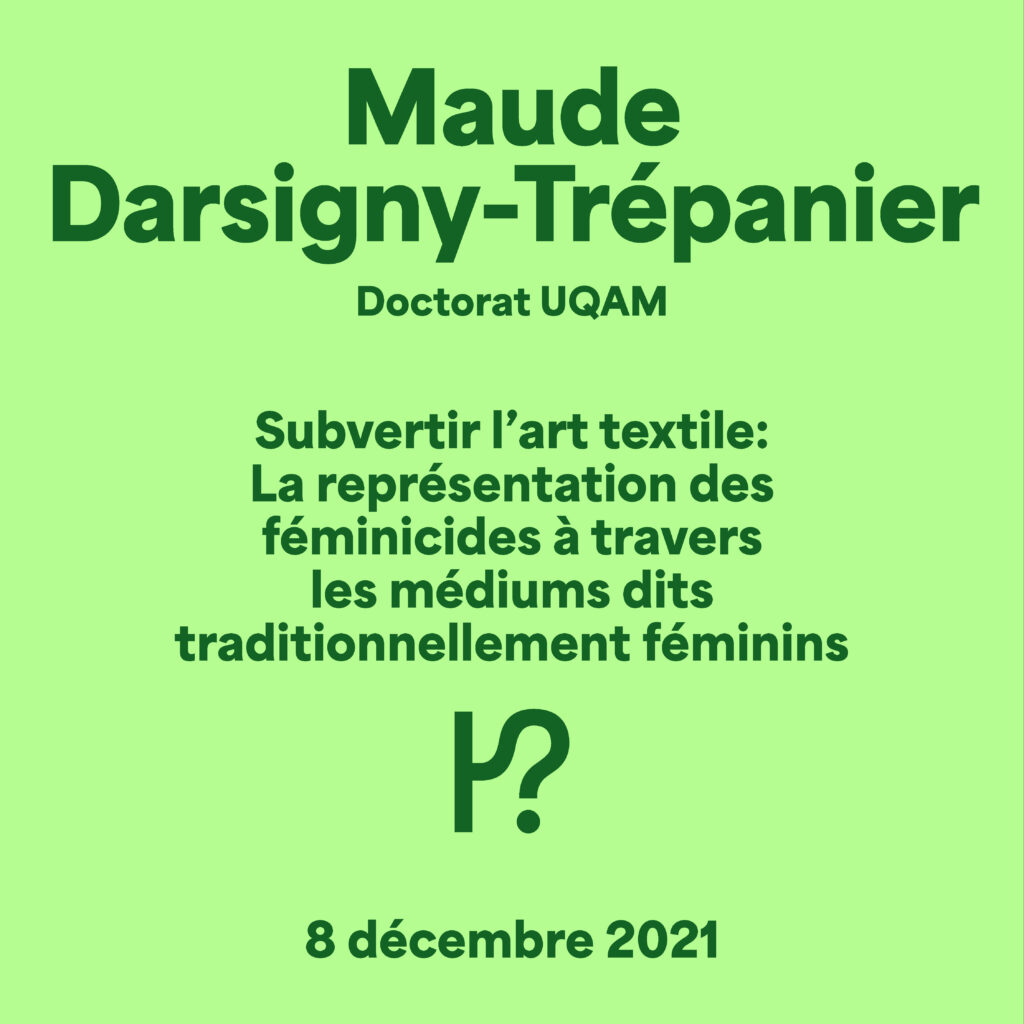
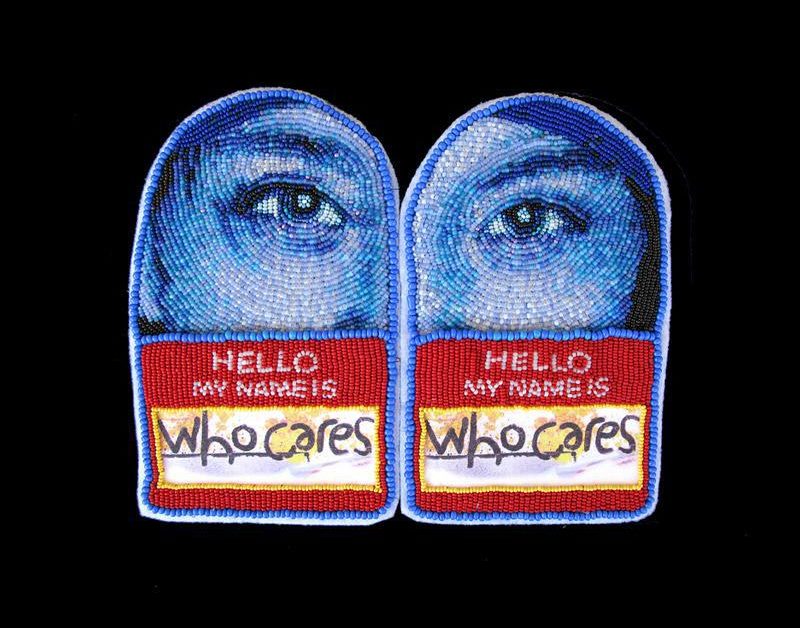
Pour ce colloque, je propose une communication qui se veut un tour d’horizon ou une sorte de recension de certaines artistes qui utilisent des médiums tels la broderie, le perlage, la courte-pointe et la vannerie pour représenter l’irreprésentable, soit, les féminicides.L’art textile a longtemps été exclu des collections des grands Musées et relégué péjorativement aux catégories dites artisanales (Janet C. Berlo et Ruth B. Phillips, 1998). En choisissant de travailler ces médiums pour représenter les féminicides, les artistes contemporaines déjouent la marginalisation sur deux angles soit, le sujet et le médium. Par la suite, je démontrerais la légitimité des arts textiles selon deux axes, le premier portant sur une relecture historique féministe intersectionnelle et décolonisante, le second étant une relecture historique décolonisante de manière à démontrer que ce type de pratiques doit être intégré à l’Histoire de l’art.Finalement, j’aborderais l’importance de la notion de grief ainsi que l’aspect de réalisation communautaire et ou grassroots de ces projets.

Maude Darsigny-Trépanier est présentement candidate au Doctorat en histoire de l’art à l’Université du Québec à Montréal où elle travaille sous la direction de Dominic Hardy. Ses recherches sont axées sur la représentation des féminicides avec l’utilisation des médiums traditionnellement féminins tels la broderie et le perlage. Maude est récipiendaire du Prix du meilleur mémoire en Études canadiennes pour son mémoire La réappropriation comme acte politique à l’ère de la décolonisation : L’œuvre de Nadia Myre. Une fois ces études de deuxième cycle terminée, Maude a travaillé au Musée McCord à titre de médiatrice culturelle durant plus d’une année. Elle revient à l’UQAM et réintègre avec grand plaisir le GRIAAC, le CRILCQ (UQAM) en plus d’adhérer au CIERA (UQAM) et au RÉC-CSN. Maude à également le plaisir de faire partie du comité de rédaction des Cahiers du Ciera en plus d’occupé le poste de coordonnatrice par intérim.
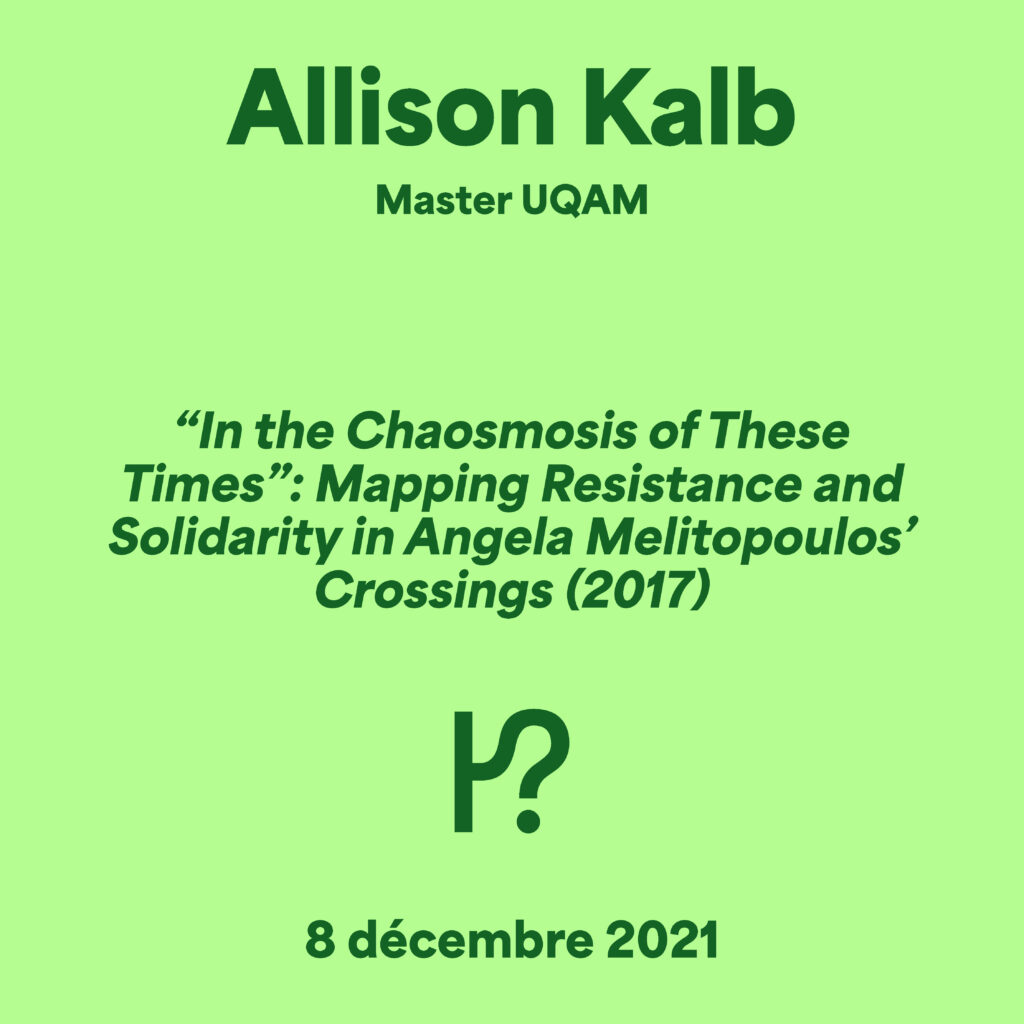
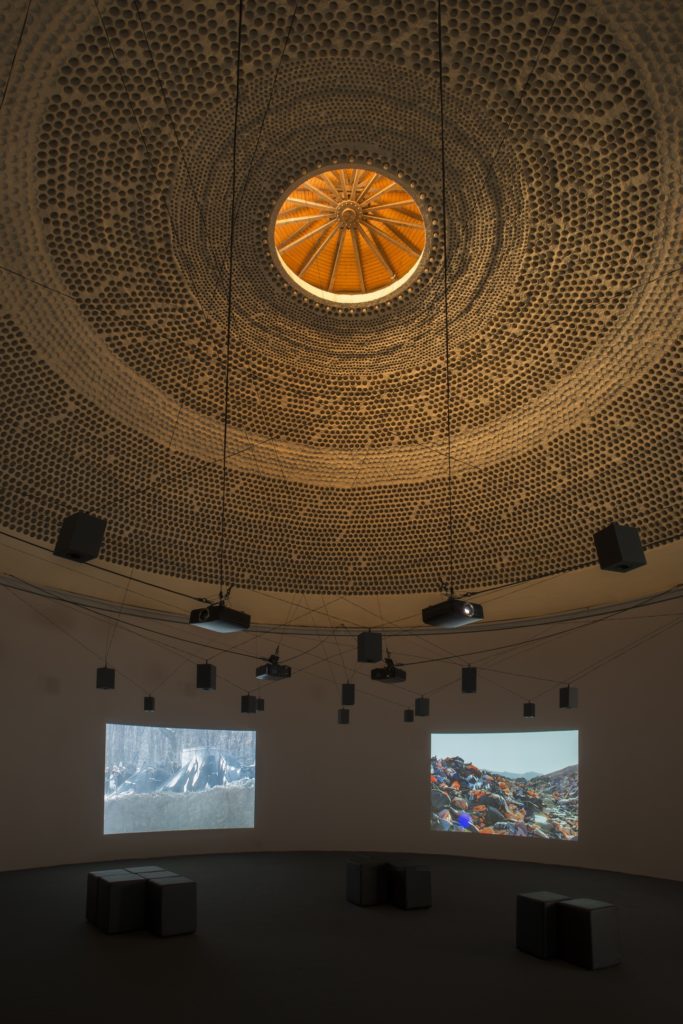
In her 2017 video-essay installation Crossings, Berlin-based artist Angelo Melitopoulos investigates the intersections of localized crisis nodes within Greece’s borders, interconnecting stories from refugee camps in Lesbos, Idomeni, and Lavrion, and sites of resistance to the environmental-destruction enacted by transnational mining corporations near Thessaloniki in northern Greece. The piece uncovers and maps a transnational “war of subjectivities installed by capitalism” that unfolded – and was exacerbated – during the national economic debt crisis and the sharp influx of refugees and migrants arriving on Greece’s shores throughout 2015 and 2016. Attending to both the work’s filmic and spatial montage, this conference will analyze how the relational cartography deployed in Crossings frames the state(s) of crisis in Greece as symptomatic of transnational extractive capitalism and how the work foregrounds lived experience of displacement and conflict as a site for knowledge production. Taking up Felix Guattari’s concept of ‘chaosmosis’, we will discuss how Crossings opens possibilities for rethinking relationality and solidarity in the midst of the chaotic experiences of extractive capitalism. This analysis will be extended to the receptive experience of the work, as we will look to the spectator’s role in the co-constitution of the meanings embedded in Melitopoulos’ storytelling and montage.

Allison Kalb is a Master’s student in the Art History program at the Université du Québec à Montréal (UQAM). Under the supervision of Dr. Barbara Clausen, her thesis examines reconfigurations of the documentary through speculative and feminist storytelling practices in the recent multimedia installations of Hito Steyerl, Angela Melitopoulos, and Joan Jonas. She worked as a research assistant and content manager for the Joan Jonas Knowledge Base, a project of the Artist Archives Initiative of New York University, which launched in October 2021. Additionally, she was responsible for the artistic programming of the 20/21 edition of the Montréal/Tiohtià:ke-based performance art festival Ripa – rencontre interuniversitaire de performance actuelle – and has been general coordinator of UQAM’s art history graduate student association (ACSHA) since 2019.
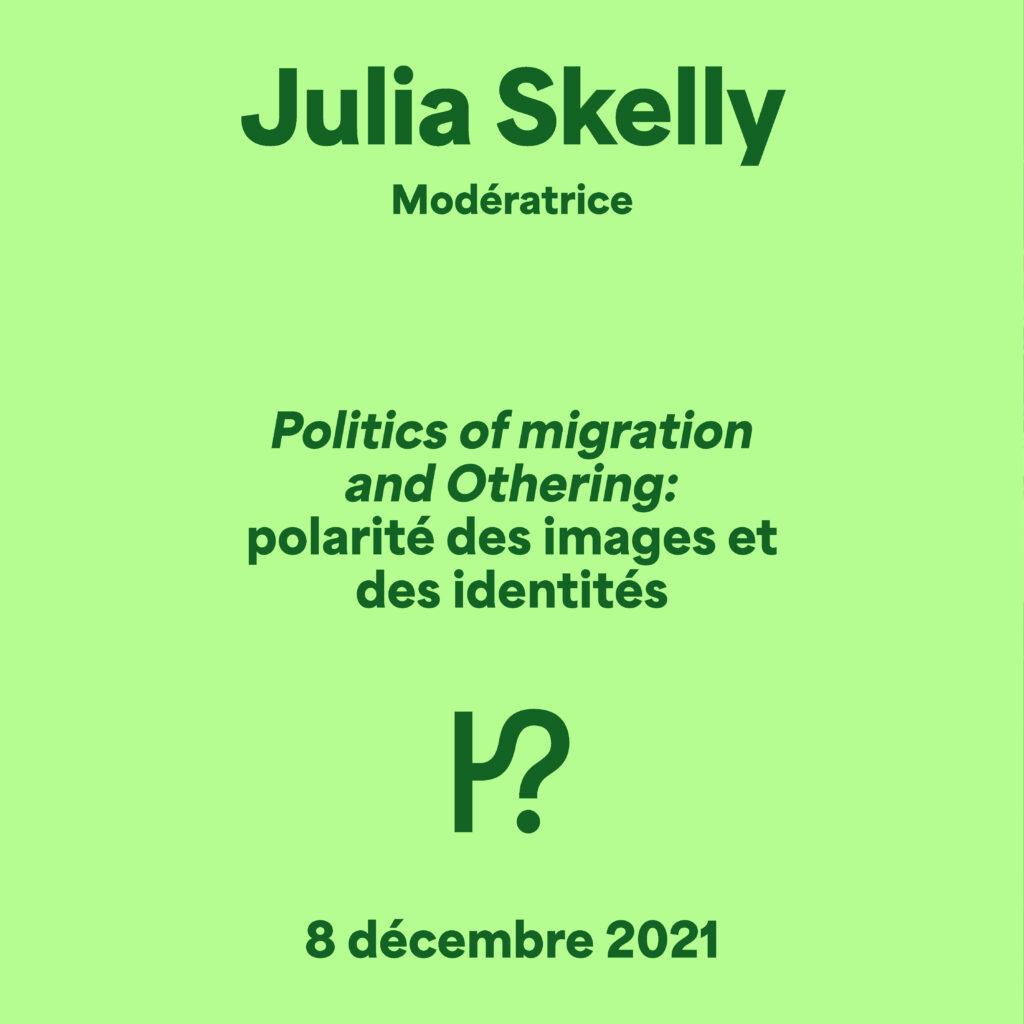
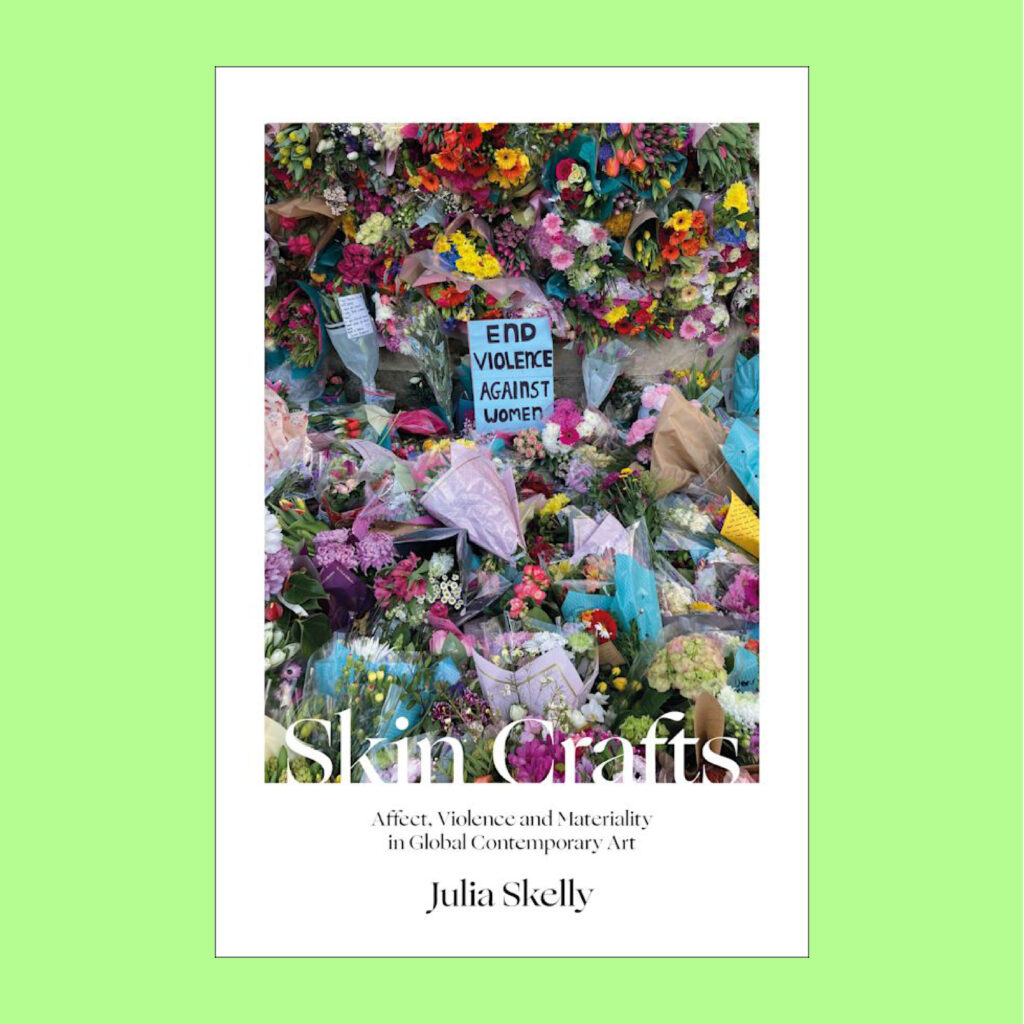
Dr. Julia Skelly specializes in feminist art and art history, craft and textiles, modern art, and global contemporary art. Her publications include Wasted Looks: Addiction and British Visual Culture, 1751-1919 (2014), Radical Decadence: Excess in Contemporary Feminist Textiles and Craft (2017), and the edited collection The Uses of Excess in Visual and Material Culture, 1600-2010 (2014). Dr. Skelly’s next book, Skin Crafts: Affect, Violence and Materiality in Global Contemporary Art, will be published by Bloomsbury in February 2022.
